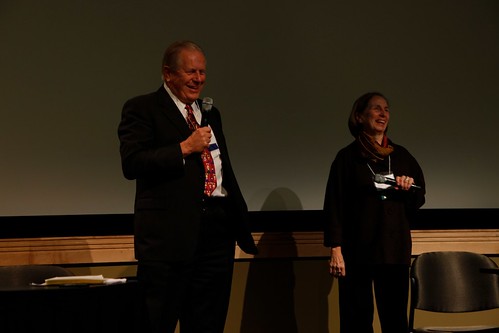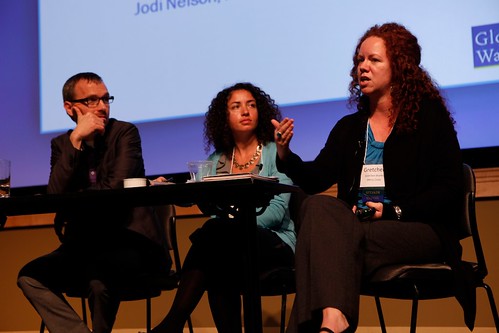Blog
Posted on November 16, 2010
Susan Jeffords and Bill Clapp wrapped up the conference with a discussion of next steps and reflections for future Global Washington Conferences.

Jeffords voiced some key lessons for Global Washington, “people have different investments and priorities they bring to partnerships…[Global Washington] has an opportunity to construct places for these people to share these different stakes and articulate them.” She added that Global Washington can take a stronger role in facilitating these interactions and is also committed to helping small organizations have a voice in Washington DC among larger organizations while gaining access to larger types of partnerships. Also, Jeffords commented on the repeated theme of improving conditions for global women and girls. She asked, “that everyone should walk out of this room and think of how to incorporate a focus on women and girls in everything we do to really build up a better world.”
Clapp concluded, the “quality of the dialogue has been a step up from last year” and “this has been an extraordinary two days.”
Submitted by Nina Carduner
Posted on November 16, 2010
The panel discussion focused on the growing pressure in the development sector for effective monitoring and evaluation in measuring the successful impact of of programs from aid and relief work to development. Much of impact evaluation often doesn’t take into account the various challenges that successful implementation of programs face on the ground and the panel discussed the challenges as well as some best practices for large and small organizations to move forward with useful evaluation methods.
Moderator Jodi Nelson, of the Bill & Melinda Gates Foundation, opened the panel with a quote pulled from a recent news article asking, “how do we ask the do gooders to prove they really do good,” which underscores the growing need and desire to hold non-profits, NGOs, and aid programs accountable to their goals and good intentions. In the past, NGOs were thought to be exempt from traditional oversight, Nelson explained. “Intention alone was considered enough proof to prove they were accomplishing their goals.”

After fielding many questions from the audience, the panel took turns in the informal discussion. Holta Trandafili, of World Vision International, discussed the shift towards applying lessons learned in the past decades and how impact evaluation can help tailor future programs for more effective implementation and greater impact. There was some question in the audience about whether evaluation was important for small organizations, which Trandafili affirmed and emphasized the need to define the type of evaluation for each organization. She explained that it’s important for small organizations to focus on asking the questions, “can we actually measure our impact and when we do, what are we going to do with what we find?” Gretchen Shanks, from Mercy Corps, added that monitoring may be more efficient for short term programs like relief and crisis programs, while long term programs really do require more evaluation to stay in line with their missions and consistently respond to the data for improvement. One of the ways that Mercy Corps champions this is by looking at the “theory of change” that is motivating their programs. While there is not one set of tools that is ideal for community mobilization in these programs, continuous resource allocation, building in participatory channels for the communities that are being served, and monitoring processes are key.
Innovation was also discussed by the panelists. Many times, the funding environment for non-profits and NGOs does not create space for failure. The environment is competitive and the structure of funding and project cycles disincentivizes monitoring and evaluation. Shanks expressed, “we feel like we can’t talk about failure openly,” which makes innovation difficult. Nigel Biggar, of Grameen Foundation, shared that successful innovation will come when experimental programs require less cost and time to be evaluated. Doing so will enable ineffective programs to fail quickly without much cost, “so we can learn and build on those quickly,” and lead the way for more innovation.
Submitted by Nina Carduner
Posted on November 16, 2010

Submitted by Pam Kahl
Steven Gunderson, President of the Council of Foundations and former WA-state congressman and Renee Acosta, CEO of Global Impact opened Day 2 of Global Washington. Steve highlighted the growth in global philanthropy, citing statistics such 300% increase in giving by Brazilians, $5.5 billion contributed in India in 2006 and the fact 800 new foundations have been established in China in the last five years. In addition to the financial statistics, Steve noted that overall philanthropy is taking a more central role in society. Younger generations are more focused on contributing to global issues than previous generations.
In the last five years the notion of philanthropy has evolved from competitive grant making to a focus on strategic investments – most recently with a focus on integrating with public and other private entities around common goals. As a result, many now look to philanthropy to lead innovation instead of the traditional drivers such as government and corporations. During the Q&A Steve made the key point that philanthropy and charity are not the same – charity is about passive periodic giving whereas philanthropy is about making strategic investments with multi-year commitments in mind.
Renee emphasized the importance of individual donors, noting that in the last three years individual donations represent 75% of Global Impact’s revenue. Global Impact stats also indicate that individual donors are more likely to give to a variety of organizations. Global Impact recognizes the importance of the giving sector acting as a knowledge-base to help donors make giving decisions. Renee closed by emphasizing the following:
No single tactic or giving challenge is as important as the quality of message and the ability to inspire and engage hearts and minds of donors.
Panelists:
Steve Gunderson, President Council on Foundations
Renee Acosta, CEO Global Impact
Moderator: Bill Clapp


